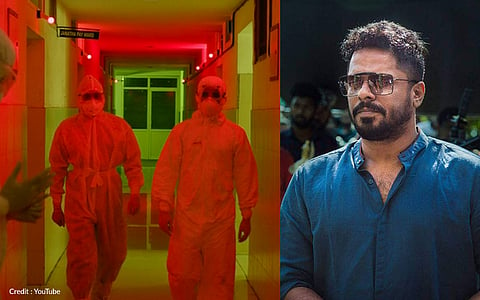
- In-Depth Stories
- Web Stories
- Reviews
- News
- FC Lists
- Interviews
- Features
- FC SpecialsFC Specials

Index patient. Treatment protocol. PPE kits. Contact Tracing. Pandemic jargon that abound Malayalam director Aashiq Abu's Virus (2019) have become household terms due to the COVID-19 outbreak—an unprecedented international health emergency that's leading to complete lockdown of countries, including India. Unlike Steven Soderberg's Contagion (2011)—that other pandemic movie that has everyone's talking about right now—Virus (streaming on Amazon Prime) is directly based on the real-life Nipah virus outbreak in Kerala in May, 2018, that claimed 17 lives. It's made with an urgency and a sense of social responsibility—and like the best of New Malayalam Cinema, is rooted in the local mores of a place (the action is set in and around the Baby Memorial Hospital in Kozhikode).
Meticulously researched by the writers Muhsin Parari, Sharfu and Suhas, that involved interviewing over 100 people, Virus employs the chain-of-events aspect of such investigations to craft a scientifically solid procedural that's also high on emotion, featuring the who's who of the Malayalam film industry—including Parvathy Thiruvothu, Tovino Thomas, Revathy, Poornima Indrajit, Indrajith Sukumaran, Kunchako Boban and Rima Kalinga—who play medical professionals and health officials who risked their lives to prevent the outbreak from spreading further. "One of the first things we decided was that it should be a box-office hit. The mass needs to know," Abu had said in an interview with Film Companion when the film was screened in Mumbai as the inaugural film for FC Blockbuster.
As the world shuts down due to the Coronavirus, with Kerala, yet again, showing more promptness than the other states in its response to the outbreak–the state government announced a package of Rs 20,000 crore to fight the COVID-19–we did a short interview with Abu (the questions were sent a week ago as text messages on WhatsApp) about the unexpected and undesired relevance of Virus, the links between better Public Healthcare and a socialist government, and the purpose of art.
I was rewatching Virus last night and it's like what went on in Kozhikode and Malappuram in May, 2018 is happening right now all around the world.
Yes, its eerie.
The film was shot in real locations, such as isolation wards where Nipah Positive patients were admitted and the medical college campus. Why did you feel the need to shoot at these locations?
Not all the scenes, but few portions including the isolation ward. The time we started shooting, the ward was kept ready for emergency situations and was free to shoot. We created Emergency room which was actually a film set.
The issue we face now especially in India is about how much we believe in science. Covid 19 has a low mortality rate of less than 3 percent but the the transmission dynamics are very different from Nipah
You and your team of writers went through extensive research working on the film. You have a larger understanding about how such a pandemic can occur. What can you say about the Coronavirus (that can be helpful for the public)?
I think by now, we have enough scientific information about the recent Covid 19. The issue we face now, especially in India, is about how much we believe in science. Covid 19 has a low mortality rate of less than 3 percent but the the transmission dynamics are very different from Nipah. And there are huge possibilities for community spread which is currently devastating medical systems in several countries. The only way out is to trust scientific information and produce knowledge about the virus.
The Kerala government was swift and proactive in terms of dealing with the Nipah virus outbreak. How are they dealing with the current situation? I just read in a news website that they are estimating 65 lakh patients in Kerala for Corona, and there's a need for 2.5 lakh ICU beds.
The Left government in Kerala lead by the Visionary Communist Pinarayi Vijayan has been working tremendously well on public health and public education in the state. The public health department headed by one of the most efficient and proactive ministers of his team, Smt KK Shylaja teacher is unbelievably good at her work. Kerala in actually setting a lot of examples for the whole world to follow in public health, which is a matter of pride for us.
The left politics in Virus are implicit. Health is known to be of high priority in Kerala (it has 95% coverage in terms of immunisation, the highest in India). Would you say there are links between better Public Healthcare and a communist government?
Yes of course. There are links, and Kerala is proving it again and again to the world.
The movie is bigger than just the Nipah Virus. It's about a community working together to prevent a disaster, it's about the Fear of the Other. And you have the beautiful ending, where you show Zakaria, the index patient, tending to an injured bat pup. I would like to end the interview with asking you what role art plays in times of crisis such as this.
We could try and give people hope at the time of crisis through our art.